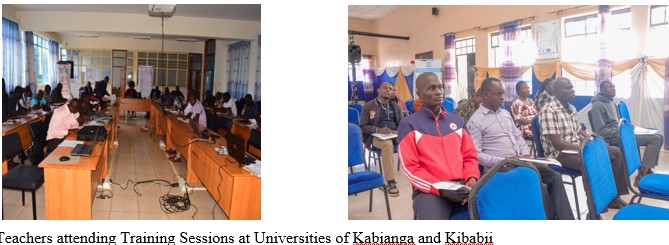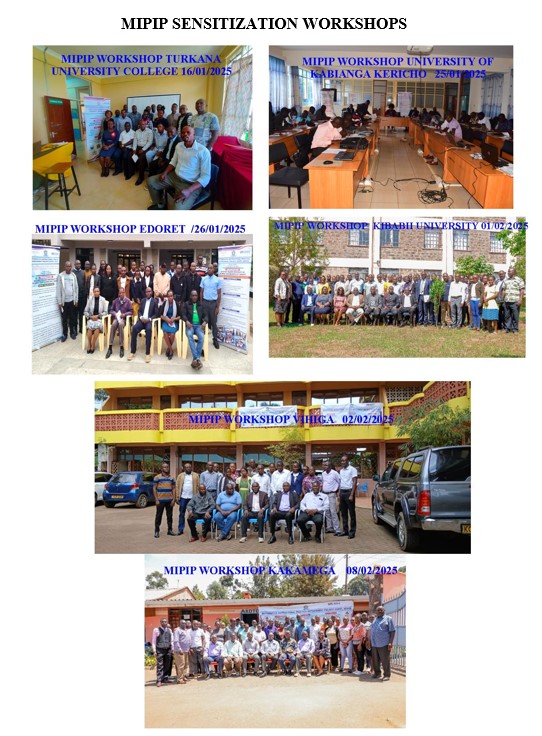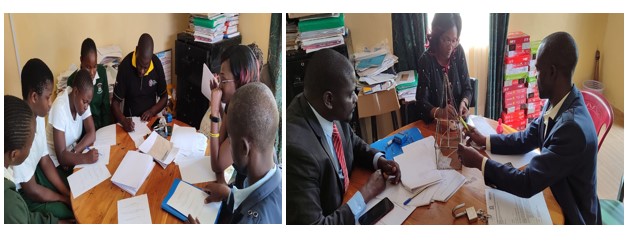MIPIP-Kenya is a project funded by the Global Partnership for Education (GPE), Knowledge and Innovation Exchange (KIX), a joint endeavour with the International Development Research Centre (IDRC) and led by Prof. Martin Wanjala as the principal investigator. MIPIP seeks to improve the use of data to inform and improve practice and student learning outcomes in mathematics and involves 250 mathematics teachers’ from Kenya. The project was piloted in Kakamega County and is now up scaled to 11 other counties including Bungoma, Busia, Vihiga, Transzoia, West Pokot, Turkana, Nandi, Uasingishu, Kericho and Bomet. MIPIP promotes teachers’ knowledge & experiences in Professional Learning Communities (PLCs) as they work together. This is manifested through supportive & shared leadership, shared values and vision, collective learning & application, shared personal practice and supportive conditions in terms of relationships & structures.


The Project has held successfully 6 sensitization workshops with teachers and key stakeholders. The meetings have witnessed strengthened capacity building of teachers participating in the project and improved attitude of key stakeholders from the Ministry of Education, Kenya Institute of Curriculum Development (KICD), Kenya National Examinations Council (KNEC) towards the innovation. These meetings have also enhanced generation of knowledge through the analysis of learner errors on mathematical tasks, use of data-driven approaches and digitalization of content. The teachers have had an opportunity to network with colleagues from other schools in other regions and also interact with university based researchers to share their experiences as they work towards improving instructional practices and learning outcomes of students in mathematics. The project also seeks to promote gender equality and social inclusion by enhancing teacher use of effective instructional practices that promote learning outcomes of all students.
During the workshops, the teachers have had an opportunity to be taken through the training on MIPIP priorities with focus on error analysis, data driven practices and digitalization of content. Through the activities, MIPIP promotes continuous learning of teachers through dialogue around effective instructional practices: peer teaching & learning, learner centered classroom practices, use of locally available resources and mathematization of environment. The teachers were brought together to report on experiences and lessons learnt in PLCs as they shared with university researchers and other stakeholders in education. MIPIP provides an opportunity for teachers to network and share experiences as they work in small groups, interview learners, design and reflect on the lessons.
Teachers are involved in addressing needs of learners based on data driven evidence through identification of errors on mathematical tasks, causes of errors, learner thinking and how to address the errors through joint reflective lessons. They are also involved in analysis of content, prepared teaching materials including notes, worked examples and exercises, activities and learner experiences based on the learning management system. Teachers engage in deep and meaningful data driven dialogue, examine own classroom data to learn how to pinpoint student learning challenges, select instructional interventions and monitor progress towards reaching student learning goals. MIPIP seeks to streamline Gender Equality and Inclusion (GEI) initiatives through unbiased materials preparation, and ensuring gender-equitable, inclusive illustrations and language in instructional materials.

Teachers engaging learners and sharing experiences in a PLC in one of the schools
Teachers were encouraged to focus on peer instruction, teacher learning, team work & collaborative working, GEI practices. During the workshops, emphasis was also placed attitude change through use of role models, teacher learning and improved confidence, use of unbiased language and materials, mathematization of environment and ICTs Uptake in instruction.
The trainers emphasized teacher use of effective strategies that are learner centered, encourage participation in classroom activities and achievement in mathematics. These include Explicit, systematic instruction; Universal Design Techniques for learning involving multiple methods of engagement, representation and expression; Process and Content Standards guidelines for preparation of instructional materials, activities and content. Emphasis was also put on the use of probing and pushing questioning technique, digitalization of content and use of the Learning Management System.
The workshops have created a good opportunity for teacher learning, sharing experiences and networking. Through the Knowledge Network of Mathematics Educators (KNME) created, the teachers have free access to MIPIP materials including training guides, digital content preparation and teacher learning monitoring tools and templates that enhance their knowledge and skills as they work in the professional learning communities. MIPIP has created opportunities for teacher professional development and encouraged the teachers to learn from one another and translate it into practice.
“This work was supported by the Global Partnership for Education Knowledge and Innovation Exchange, a joint endeavour with the International Development Research Centre, Canada.”


